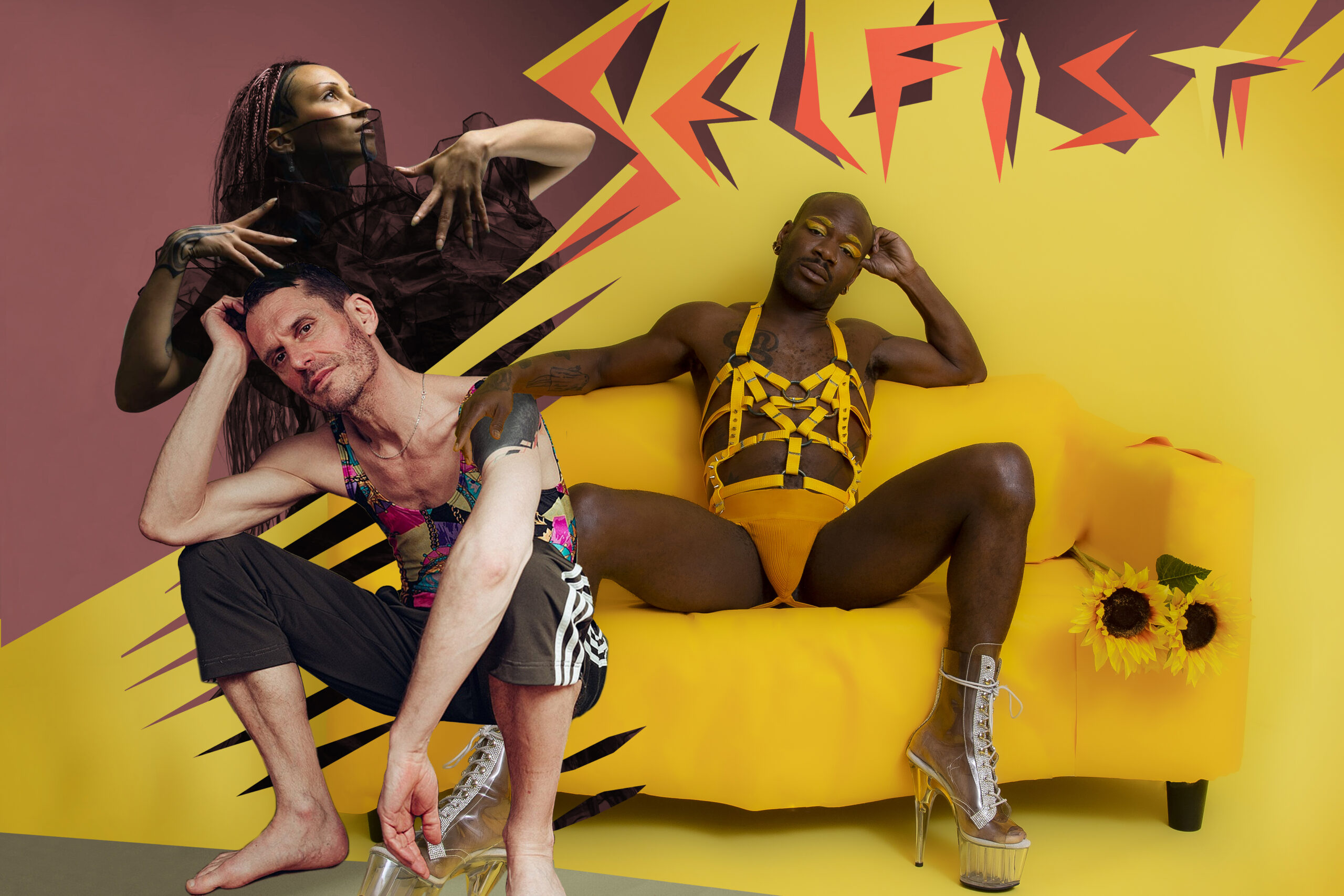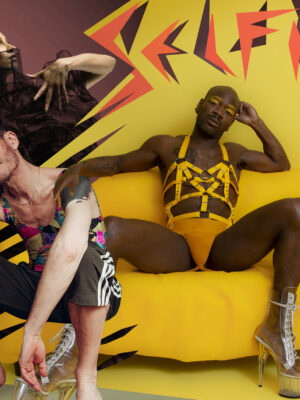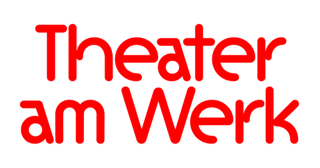SelFist
Bang Bang my baby shot me down.
And what if My baby was just that part of us that has swapped bullets for bursts of images, where every selfie sounds like a shot to the temple of identity?
The images are beautiful – sometimes enough to make you fall in love with them. But death whispers something in them. It breathes into each reflection a form of symbolic necrophilia, where the image becomes that place of Barthesian ‘it has been’. The frozen object is already lost. It is already beyond what the eye can grasp. The image registers this loss: it speaks of the end, it speaks of death. For Barthes, this is the price to pay – the image is not a memory, it is a silence in which disappearance finds its voice. A shroud still damp from what was desired, touched, tasted, then swept away by time.
SelFist takes us deep into the mirror, where the ego licks its wounds. Sunny, Max and Bishop, three performers with radically different artistic backgrounds, take to the stage on an inner journey – a vertiginous descent into the blurred zones of the self, where the gaze wavers and beauty is negotiated between mirage and fracture. Some grief eludes language, and in this eclipse of the word, perhaps the truth lies hidden beneath the ruins of what we think we understand.
SelFist invites us to derail the imaginary, fragmenting bodies, spaces and narratives – until perception itself sizzles, and the mechanics of evocation grind to a halt.
Credits
artistic direction/choreography: Elisabeth Bakambamba Tambwe // developed and performed by: Bishop Black, Max Mayer, Sunny Jana // research and dramaturgy: Benoît Jouan, Leila Vidal Sephiha // music and composition: Ursula Winterauer, Bishop Black // light design: Sveta Schwin // video: Eduardo Triviño Cely // stage and costume design: Ariel Elbert // production: Indra Jäger // online communication: François Tambwe
Excerpts from Hardwerk Sessions: Bishop, Kali, Aaron (dir. Paulita Pappel, 2024, DE) are shown with kind permission. Our sincere thanks to the filmmakers and producers.
titelpic : © collage David Pujadas Bosch for Dig Up Productions, portraits by Joel Heyd, Didi Ana Pidal, Stefan Panfili
Produced by: Dig Up Productions
Co-production: ImPulsTanz – Vienna International Dance Festival, THEATER AM WERK, Vienna
Supported by: MA 7 Stadt Wien Kultur
BIOS
Bishop Black (they/them) is a British artist who has been performing for seven years, first as a performance artist, then moving into drag and later burlesque. He expresses himself primarily by using his body as a language and politicised tool, through sexuality and gender. Having worked in film in recent years, he is mainly on stage, developing unique yet interconnected performances that utilise mythology, occultism, queerness and dance. In all works, the intention to create atmospheres through music and acting is seen as a leitmotif that aims to evolve and grow by releasing what could be seen as ridiculous, revitalising and unlocking the inhibitions felt in one’s own body.
Born in Vienna in 1974, Max Mayer studied acting at the Vienna City Conservatory. After numerous works as a freelance actor, he was a member of the ensemble at Schauspielhaus Graz from 2006 to 2008, the ensemble at Schauspielhaus Wien from 2008 to 2013 and Schauspiel Frankfurt from 2014 to 2016. In 2011, he was awarded the Nestroy Prize for ‘Best Actor’. Further engagements have taken him to the Thalia Theatre Hamburg, Deutsches Schauspielhaus Hamburg, Schauspielhaus Bochum, Burgtheater Vienna and Schauspiel Köln. He works closely with director Robert Borgmann and visual artist Jonas Vogt. Since the 2019/2020 season, he has been a member of the ensemble at the Residenztheater in Munich, where he also develops his own projects. In 2023, he performed at the ImPulsTanz Festival as Jérôme Bel by Jérôme Bel.
Sunny Jana is an Austrian American artist. She works as a multidisciplinary artist, sculpting hair sculptures, pole dancing, painting, and creating food fantasy. Sunny wants to create art that brings a feeling of self-development and evaluation to one’s senses, questioning and challenging the audience to rethink their senses and perceptions of what is customary.
Elisabeth Bakambamba Tambwe was born in Kinshasa and grew up in France, where she studied visual arts and sculpture. In her choreographic work, the artist deals with the sensitive and fragile dimension of the body and the concept of normality, which she criticizes as tyrannical and degrading. Her most recent works have been shown at the Wiener Festwochen, steirischer herbst, brut Wien, donaufestival, WUK performing arts, ImPulsTanz Vienna International Dance Festival and Afro Vibes Amsterdam, among others.
Benoît Jouan (*1972) is an author and illustrator. He studied fine arts, and holds a university degree (Master of Visual and Plastic Arts/ Lille III University, France) and an art school degree (National Superior Diploma of Expression of Plastic Arts-DNSEP & National Diploma of Plastic Arts-DNAP of the School of Tourcoing, France). He worked for twenty years (1999-2019) at the Lille Métropole Museum of Modern, Contemporary and Outsider Art (LaM), in Villeneuve-d’Ascq (France) as a lecturer and art workshop leader (specialized in engraving) in closed environments such as psychiatric hospitals and prisons. He has been working with Elisabeth Bakambamba Tambwe since 1998. He moved to Vienna in March 2022 where he lives and works now.
Leila Vidal Sephiha, born 1994 in Paris, is a directrice, dramaturg, performer and theatre scholar. She studied humanities and theatre studies at the University of Paris Nanterre and the Ludwig- Maximilians-University of Munich, and researched Nicolas Stemann’s creative process from 2017 to 2022 for a PhD. In 2015, she began working as a theater practitioner in Germany (including two documentaries for the Akademie der Künste Berlin). After numerous experiences (Münchner Kammerspiele, Théâtre Nanterre-Amandiers, Ruhrtriennale, Opéra Comique de Paris, Maxim Gorki Theater, Théâtre de Vidy-Lausanne, etc.) Leila Vidal Sephiha was assistant director at the Schauspielhaus Zurich and worked closely with five associate directors: Nicolas Stemann, Yana Ross, Alexander Giesche, Christopher Rüping and Leonie Böhm (2019 to 2022). As an artist, she is the initiator and part of the artistic team of projects with different media such as the short film KOMODO Danger en voie de disparition (about the eponymous endangered species), the pieces Performers Rule: B612 (Laura Weibel’s performative and meditative video essay on mourning and memory) and Performers Rule: Soï (improvised duo of body expression and free music in search of oneself with musician Samuel Boutros).
Ariel Elbert (they/them), stage and costume designer with a diploma from the HfBK Dresden, has worked on projects such as *Beyond the Overflow* (2023) and *Speech of Love – Absence* (2022) with Elisabeth Bakambamba Tambwe – Further works include *Performance HALT* (2021), *SOMATOGENESIS* (2021) and *Dining Room* (2020). Ariel works freelance on various performance and art projects and has worked as an assistant on productions such as *Le Grand Macabre* (2021) by Martin G. Berger and *Replacement Place* (2015) by Patricia Noworol.
Ursula Winterauer alias Gischt lives and works as a composer, electronic music producer and curator in Vienna. Her works deal with raw and brutal sounds in digital over-determination, delivering differentiated interpretations of the industrial, techno and ambient genres. Winterauer is the bassist of the doom pop band Eaeres and is part of the duo The Answer is No with Maja Osojnik. She works as a sound designer and composer for film and develops compositions for contemporary dance, is label boss of Ventil Records, co-organiser and commercial director of the Unsafe+Sounds Festival and curator of New Salt – Festival for sonic exploration & digital art.
https://gischt.xyz/
https://www.instagram.com/gischt____/
http://ventil-records.com/
Svetlana Schwin was born in Krasnoturyinsk in the Urals in 1984. She studied performing arts in Bremen (Germany) and theatre studies and philosophy in Vienna. She works as a freelance lighting designer, theatre director and author in Vienna. The youth play ‘Pietro Pizzi’ won the Jungwild Förderpreis and the STELLA. She took part in the writing workshop at the Schauspielhaus Wien theatre. The radio play ‘Mein Mitleid mit den Dingen’ won the special prize for poetry in the 2018 competition for short radio plays. As a lighting designer, she works with independent groups in the dance and performance scene. She creates her own light objects and light installations, such as the lighthouse in 2020. Her performance ‘Kuss’, a play with body and light, has existed for over 9 years in 4 versions and has been shown at WUK, Werk and Ballhaus Ost in Berlin, among others.
Eduardo Triviño-Cely was born in Bogotá, Colombia, in 1990. He lives and works between Colombia and Austria. Through experimental processes in sound, sculpture and digital media, he intervenes in public space with installations, performances and actions. He explores the value of failure, mistakes, the invisible and the limits of perception. In doing so, he searches for new perspectives on our natural environment and questions cultural concepts. With a background in the visual arts, he is self-taught in his approach to sound and operates in the experimental realm, incorporating materials, concepts, new technologies and body parts. His years of working in theatre have led to his artistic work being influenced by set design, acting, props and dialogue.
Indra Jäger, born in Frankfurt/Main, has been living in Vienna since 2000. After studying journalism and communication sciences she co-initiated and directed the art and culture association IM ERSTEN (2012-16). Since then, she is working as a curator and producer, since 2022 for Dig Up Productions. In 2023 Indra joined the Austrian solution journalism platform relevant.news as an editor and chief of service.




